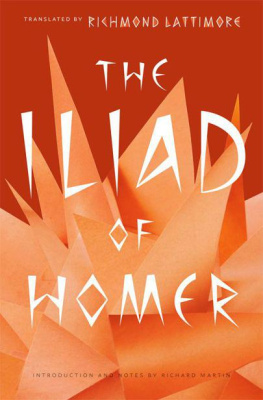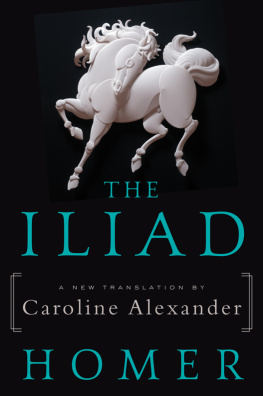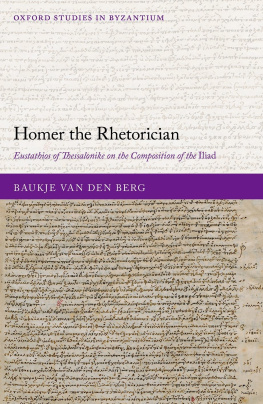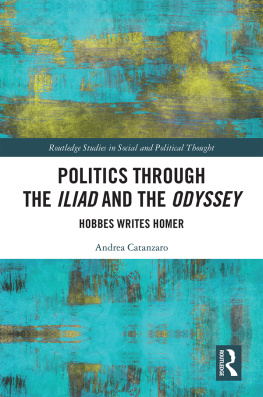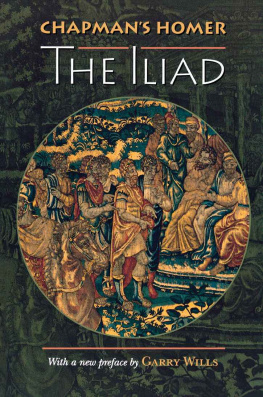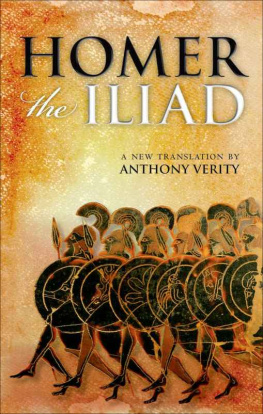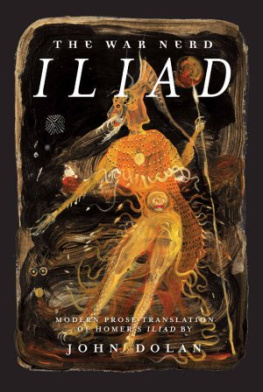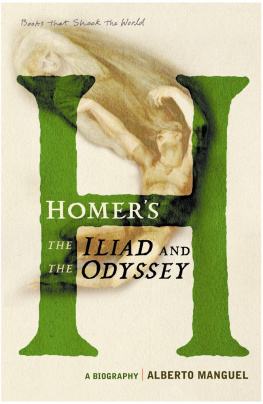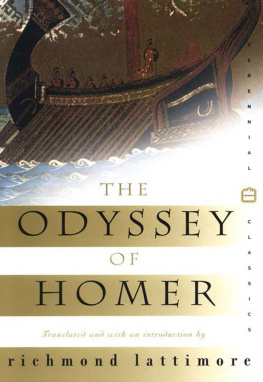Lattimore Richmond - The Iliad of Homer
Here you can read online Lattimore Richmond - The Iliad of Homer full text of the book (entire story) in english for free. Download pdf and epub, get meaning, cover and reviews about this ebook. year: 2011, publisher: University of Chicago Press, genre: Art. Description of the work, (preface) as well as reviews are available. Best literature library LitArk.com created for fans of good reading and offers a wide selection of genres:
Romance novel
Science fiction
Adventure
Detective
Science
History
Home and family
Prose
Art
Politics
Computer
Non-fiction
Religion
Business
Children
Humor
Choose a favorite category and find really read worthwhile books. Enjoy immersion in the world of imagination, feel the emotions of the characters or learn something new for yourself, make an fascinating discovery.
- Book:The Iliad of Homer
- Author:
- Publisher:University of Chicago Press
- Genre:
- Year:2011
- Rating:5 / 5
- Favourites:Add to favourites
- Your mark:
- 100
- 1
- 2
- 3
- 4
- 5
The Iliad of Homer: summary, description and annotation
We offer to read an annotation, description, summary or preface (depends on what the author of the book "The Iliad of Homer" wrote himself). If you haven't found the necessary information about the book — write in the comments, we will try to find it.
The Iliad of Homer — read online for free the complete book (whole text) full work
Below is the text of the book, divided by pages. System saving the place of the last page read, allows you to conveniently read the book "The Iliad of Homer" online for free, without having to search again every time where you left off. Put a bookmark, and you can go to the page where you finished reading at any time.
Font size:
Interval:
Bookmark:
The University of Chicago Press, Chicago 60637
The University of Chicago Press, Ltd., London
1951, 2011 by The University of Chicago
All rights reserved. Published 2011.
Printed in the United States of America 20 19 18 17 16 15 14 13 12 11 1 2 3 4 5 ISBN -13: 978-0-226-47048-1 (cloth)
ISBN -13: 978-0-226-47049-8 (paper)
ISBN -10: 0-226-47048-2 (cloth)
ISBN -10: 0-226-47049-0 (paper)
ISBN -13: 978-0-226-47048-1 (e-book) Homer.
[Iliad. English. 2011]
The Iliad of Homer / translated by Richmond Lattimore ; introduction and notes by Richard Martin.
p. cm.
Includes bibliographical references. paper)
ISBN -10: 0-226-47048-2 (cloth : alk. paper)
ISBN -13: 978-0-226-47049-8 (pbk. : alk. paper)
ISBN -10: 0-226-47049-0 (pbk. : alk. paper)
I. paper)
I.
Lattimore, Richmond Alexander, 19061984.
II. Martin, Richard P. III. Title. IV. Title: Iliad.
PA 4025.
A 2 L 38 2011
883.01dc22
2011007970  This paper meets the requirements of
This paper meets the requirements of
ANSI / NISO Z39.481992 (Permanence of Paper). RICHMOND LATTIMORE was professor emeritus of Greek at Bryn Mawr College at the time of his death in 1984. He was coeditor (with David Grene) of The Complete Greek Tragedies, translator of Greek Lyrics, and author of Poems from Three Decades, all published by the University of Chicago Press. RICHARD MARTIN is the Antony and Isabelle Raubitschek Professor of Classics at Stanford University.
OF
HOMER
INTRODUCTION AND NOTES BY RICHARD MARTIN THE UNIVERSITY OF CHICAGO PRESS
CHICAGO AND LONDON
STANFORD UNIVERSITY
Yet, in the early twelfth century BC the time period in which this story is setthere were no identifiable concepts of Western and Eastern cultures (much less Greece or Turkey as nation-states). Even when the Iliad was composed, somewhere in the archaic period of Greek history between 750 and 550 BC , there seems to have been little concern among cultures bordering the Mediterranean to differentiate East from West: from Sicily to Sardis and beyond, trade goods, musical modes, stories, artistic styles, and people circulated and interacted in creative profusion. It was early in the fifth century BC that attitudes changed. In 490 and again 48079 BC , invasions by the massive forces of the expanding Persian empire (centered in modern-day Iran) were turned back by a ragtag coalition of Greek city-states, on Greek soil. This spectacular, unexpected victory was celebrated by Greeks of the ensuing Classical age through temple sculpture, murals, vase painting, oratory, and dramatic literature that proudly made verbal and visual analogies between the Persian wars of recent times and the heroic successes of the Trojan War. The Greek historian Herodotus, writing in the middle of the fifth century, attributes to Persian intellectuals (logioi: Histories 1.1) the view that the ancient expedition to bring home Helen of Sparta was the beginning of antagonism between Asia and Europe.
But it is clear that Greeks of the historians own time were thinking the same way. The singular beauty and importance of our Iliad stand out starkly in contrast to such later, politicized interpretations of the story of Troy and to an insidious Orientalism that has its roots in Greek antiquity. It is not about a clash of civilizations, much less so a contest between evil and good. Unlike many a later epic (including Virgils Aeneid), this poem does not deal with ethnic, national, religious, or ideological conflicts and aspirations. In fact, it is difficult to determine the poems real protagonist: the Greek Achilleus and his victim, the Trojan Hektor, are attractive and repellent in equal degrees. Some would say Hektor is actually the more sympathetic character.
The Iliad is about heroes as humans, and what constitutes humanity. Its enduring value lies in the poems recognition that even the worst enemies are deeply, fundamentally the samedesirous of glory and immortality, while subject to pain and death. Its powerlike that of so much Greek literaturecomes from the realistic depiction of mortals as they gradually learn that they can never be gods. In this existential recognition, it transcends the anxieties of tribe or state. The story of a war to take Troy, in other words, is primarily a backdrop for human concerns that fascinate audiences in any age. The Iliad would be just as compelling a piece of art even if Troy existed only in the imagination of poets.
Nevertheless, through the centuries, the attractive power of the epic has been compounded for many readers by the dark mysteries that surround it. Did a Trojan War really take place? How did the poet Homer know of it? Did a man named Homer even exist? When, where, and how was the epic composed? How did it achieve such perfection and influence? In what follows, we shall explore briefly the answers that have been offered for these questionsthough never totally agreed uponwhile placing the Iliad in a series of relevant historical and cultural contexts. First of all, it is important to realize that the Iliad is an Iron Age poem about an event supposed to have taken place in the Bronze Age. Historians in ancient Greece, working with family memories and temple records, came up with a range of dates for the Trojan War from 1184 BC (Eratosthenes), to around 1250 BC (Herodotus) to 1334 BC (Douris). More than four centuries thus elapsed between the latest traditional date given by the ancient Greeks themselves for the destruction of Troy and the earliest possible recording of the epic in written forma longer gap than that which separates us from the time of Shakespeares maturity. Therefore, the Iliad as we have it cannot be based directly on an eyewitness account, or even a reliable reminiscence from the poets great-grandfather.
It is not impossible that it ultimately derives from poems and stories originating with actual survivor tales, but the form in which we have it cannot possibly itself date to the twelfth or thirteenth century BC . To begin with, most of the linguistic forms in the Iliad come from a later period. By extension, the concerns of the poem are most likely not those of the original fighters at Troy but of a societyor multiple societiesgenerations later that looked back to the Trojan War as an important symbolic event, perhaps for the very foundation of their own communities. Even if the kernel of the Iliad was put into poetic form nearer to the time of the fall of Troy, in the intervening centuries before it achieved its final status the story was certainly subjected to all sorts of changes in length, expansiveness, and detail, through stylization, shifts of emphasis, and innovations in characterization and plot. Above allas literary critics since Aristotle have acknowledgedthe epic makes no attempt to narrate the whole story of a war against Troy, focusing instead on only a few days in the tenth and final year of the Greek siege against the city, and on a personal dispute (albeit one with vast consequences) within the ranks of the assembled Greek warriors. The poems concentrated force relies on an audience that already knows most of the basic details about the struggle, an audience that has probably encountered many other versions of the tale of Troy, from tellers whose names we will never discover.
Next pageFont size:
Interval:
Bookmark:
Similar books «The Iliad of Homer»
Look at similar books to The Iliad of Homer. We have selected literature similar in name and meaning in the hope of providing readers with more options to find new, interesting, not yet read works.
Discussion, reviews of the book The Iliad of Homer and just readers' own opinions. Leave your comments, write what you think about the work, its meaning or the main characters. Specify what exactly you liked and what you didn't like, and why you think so.

